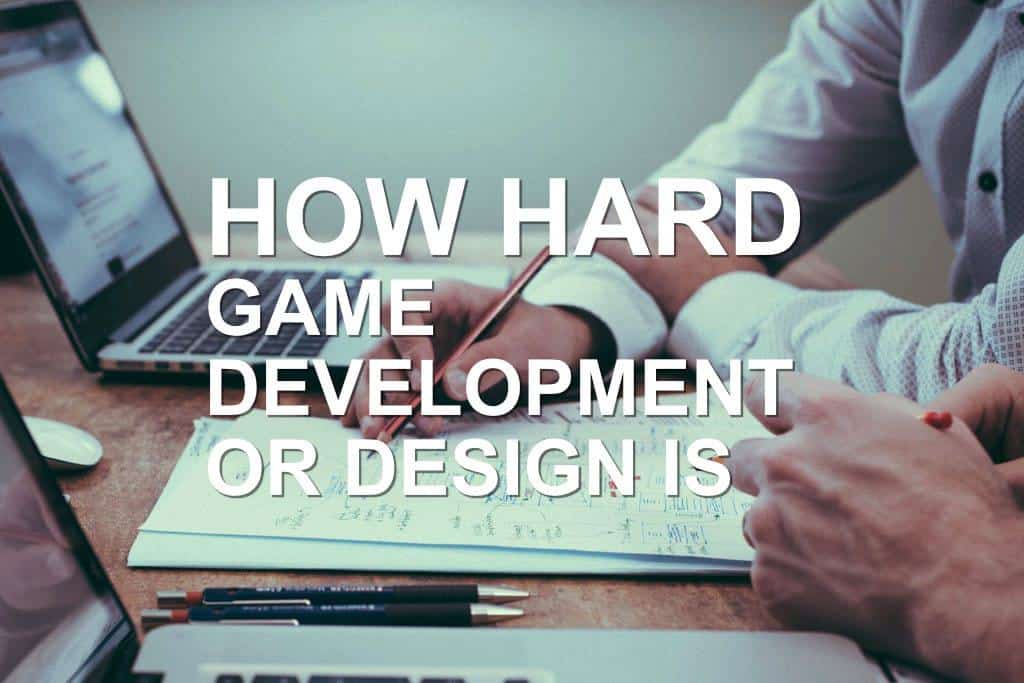Playing games is a lot of fun, and a lot of kids today will grow up wanting to design their own games in the future. There are many ways to get into the gaming industry, whether it be as an artist or a programmer. You can also be a sound engineer, or try to get your feet wet via game testing.
So, how hard game development\design is and is it worth it? Don’t try to become a game developer\designer if you don’t love gaming itself. You could just as easily use your programming skills learned from school to become a web developer or app designer.
The truth is if you can’t handle failure well and don’t have the will to get back there and try again, you probably won’t make it very far. Game development is always evolving and highly competitive, with a lot of specializations involved just to design one game.
But if you are serious about game development/ design, there are plenty of skills you need to acquire depending on which role you intend to fulfill within the team. Some of these skills can be learned through a formal degree in a college. For others, you can teach yourself how to do stuff by using online resources like paid courses, Youtube videos, blogs, etc.
If you manage to make it through the competition and get hired into a game studio, the payout can be quite rewarding. Even junior-level game designers can earn significantly more than the median annual wage, in the US. Keep in the fact that data shown as of today might vary a few months or years later, by the time you’re reading this article.
But on average, game designers make a significant chunk of money if they’re working in a big AAA studio under some publisher like EA or Activision. It isn’t uncommon to hear of base salaries in the 100k to 200k range for senior game designers with over 5 to 7 years of experience. As an example, let’s look at this data from Glassdoor which states that the average base pay of a lead game designer to be around $70,000/ yr. According to their data (obtained from community submissions) companies like Zynga, Microsoft, Blizzard, Riot, and EA pay the highest salaries. With additional cash compensation (like bonuses) on top of that.
Of course, data on salaries will vary depending on which source you refer to. But it is a verifiable fact that game designers and programmers on average make well above the median income (not including indie devs). And they do so while creating pieces of art that will be played and loved for decades by millions around the world.
What’s The Difference Between Game Development And Game Design?
Game design is one of the many aspects of game development as a whole, it involves coming up with ideas for a game. Like how it should play, what genre it should be, etc.
Think of the game designer as the director of a movie. Designers come up with a vision, and programmers transform that vision into reality by writing code and implementing it via a game engine such as Unreal or Unity. As a designer, you’ll be required to be at least somewhat proficient with art and direction.
There can be many types of designers within a single development team- level designer, art designer, cinematic designer, etc. Similarly, there can be many types of programmers- AI programmer, physics programmer, network programmer, etc. Each specialization has its own unique set of qualifications. Large studios will hire dozens of teams to work on a single project under the lead of a senior developer.
Things That Make Game Design/Development A Very Hard Task

The first aspect of game design/ development that makes it so intimidating, is the amount of time it takes to create just one part of one game. There’s a reason why big publishers and studios hire hundreds of people for AAA titles like Need For Speed or Call of Duty.
Ask any indie dev, and they will tell you how hard it is to come up with the art, core logic, AI, character models, etc. all by yourself when you’re part of a 2 or 3 man team. As a game designer or programmer, your life revolves around the game you’re making.
And you constantly keep introducing improvements, polishing the product, until it meets your personal goals. You’ll spend the majority of your day in the studio, and that can really bite into the time you allocate for other things and people in your life.
The inability to communicate efficiently will also hinder your prospects of becoming a successful game developer. Communication is key within a dev team, and a lot of people who are into programming tend to be rather introverted by nature. But you’ll need to express your ideas and provide feedback on changes, so the rest of the team knows if the project is headed in the right direction.
If the designer isn’t able to communicate their vision to the programmer, the end result will be half-baked, and the player will feel as though something is missing. Besides, language can be a barrier too since so many people from across the world come together to solve problems and generate community resources. English is the primary language used in books on game design, so you might want to brush up on your English skills.
The third hurdle, and probably the one that generates the most concern among aspiring game developers, is education. You might make it as an indie dev without any formal degrees in programming or computer science. You might even create a simple hobby game without any coding skills at all if you use an engine like GameMaker Studio.
But almost all big studios will require you to have two things- a formal degree in some field that is related to game development, and a certain level of experience with developing games. It is one thing to have a degree in computer science, but experience in developing games can’t be had unless you actually make games on your own time.
Even if you aren’t working for a studio or getting paid, building a portfolio is crucial. Companies don’t want to take in greenhorns and spend money for months on training them in specific software skills, they want people who can work right from the start. What makes this even more complicated is the fact that there isn’t a whole lot of clarity on exactly what constitutes a game design course.
There are several game design schools out there, but a lot of them are simply using game design as a lure to draw in young students who don’t know any better. Finding the right school and taking the correct courses is hard, and requires a lot of research beforehand.
Finally, you’ve got the location aspect. A lot of aspiring game developers don’t seem to understand why location is such a big deal. Why wouldn’t a game company want to hire a perfectly qualified candidate who just so happens to be from a different city? After all, you’re probably willing to move near the studio if you get the job. See, it’s not a matter of “are you willing to relocate”.
That’s a given, otherwise, you wouldn’t be sending in your resume. From the employer’s perspective, you’re inherently less valuable than a similarly qualified candidate who is a local. That’s because the other guy can turn up for an interview immediately, and if hired they can also start working immediately. It is objectively true that interviewing 20 people for a job is way easier if all of them are locals.
Plus, things get even tougher if you’re a rookie developer. Experienced developers living in a different city have a much higher chance of securing the job. Save up money, build an impressive resume and portfolio. Work on games in your spare time, and don’t move to a city like LA or Seattle until you know that you’re ready.
Depending on which country, state, and city you live in, your experiences as a game designer will vary significantly. Some states like Texas, California, etc. have a larger concentration of game companies which means you don’t have to go very far in order to apply for a job.
In some developing countries, the opportunities to become a game designer are few and far between. Your pay as a game designer in India will be very different compared to what you get paid as a designer in the USA. But then again, living costs will be lower in a city like Bangalore, as opposed to Los Angeles.
Salaries You Can Expect As A Game Designer/ Developer

CareerExplorer found that the average salary for a game designer in the United States is in the range of $47k (entry-level) to over $170k (top-level) per year. Note that this will change from year to year, and may go up or down by a few thousand dollars depending on demand and the state of the gaming market.
Those with a high school diploma are pretty much guaranteed to earn less than those with a bachelor’s or postgraduate degree. Salaries will vary based on whether you are a junior designer, mid-level designer, or senior designer. And salary will also vary based on state. For example, video game designers in Nevada might make less than video game designers in California.
But before we talk any more about game designer salaries, a bit of revelation is needed regarding the technical side of game design and what it really means. Video game designer’s salaries will vary on the basis of their role and experience level.
For example, there are level designers who might get paid more than UI designers. Then you have designers working on multiple projects with different release dates, these people might be compensated better compared to designers working on just one project at a time. The more stuff you are required to do, the higher your pay as a designer.
Managing a large team as a senior designer? Expect an average base pay that’s more than double or even triple the average US salary. On the other hand, things aren’t so rosy as a junior designer where you are offered an average base pay which maybe 40 to 60 percent below what a senior designer gets. And that’s fine because you’ll be working under the leadership of an experienced senior designer who’s probably been behind some of the most popular AAA games out there. Learning valuable skills at work and building up experience is what counts.
You might also be interested in knowing how a video game developer’s salary compares to that of others. On average, you might earn less than a computer network architect or hardware engineer (especially if you’re a junior game designer). But you’ll be better off than an electrical engineer or database architect. With an average growth rate of around 9%, the job market for video game designers is currently looking pretty optimistic.
As of now, there are nearly 287,200 video game designers in the US. Recruiter gives you a pretty good idea of the variance in video game designer salaries from state to state. As you can see the salary in certain places like Washington or New York is higher compared to the salary in Nebraska or Delaware. Keep in mind the data is based on research conducted during the time period of writing this article, and it might change in the future.
But unless you’re reading it after humans have already made colonies in space, there shouldn’t be THAT big of a difference in the numbers. For instance, a lead designer will still make 50 to 60 percent more money than a junior designer. And it will be well above what the average American makes. To check hourly rates and more data on current game designer salaries across various regions, visit sites like careerexplorer or Glassdoor.
Is It Worth Getting Into Game Design/ Development?
The gaming industry is growing by leaps and bounds with each passing year. It has already surpassed both the movie and music industry long ago. Now, with the rise of smartphone gaming, it has gathered a new audience of people both young and old who can access their favorite games anywhere, and at any time.
Clearly, there’s a lot of opportunity within the games industry. And, there are some of you with a passion for gaming which exceeds that of the average gamer. Within that group, there are people who take IT courses in college. Maybe you wish to create your very own games at some point, whether it be as an indie dev or as an employee within a large studio such as Bethesda or Treyarch.
However, game design and development is a very challenging field. You require a wide range of skills to break into this industry, and employers are looking for specific personality types. In the end, it’s up to you to decide whether you wish to endure all the hardship involved in becoming a game designer.
It’s not for people who don’t already love playing games. If you’re reading this while aiming to become an indie developer, think hard before you make the jump. Indie game creation has a low barrier of entry or not at all, but can be as hard as rocket science. That is if you wish to have a sustainable career. Crowdfunding is one option to foot the production bills, but it’s always hard to anticipate unforeseen costs.
You also have to consider things outside of the core production cycle, like playtesting and advertising. If your goals are a bit more ambitious, you might have to show up at the door of a recognized AAA publisher with a design document and pitch your idea for a game.
Keep in mind the fact that you’ll be competing against the likes of EA, Activision, Blizzard, etc. and extremely popular games such as Assassin’s Creed, GTA, Call of Duty, etc. It is extremely important to come up with a target audience for your game, and design + market accordingly.
Even if you’ve got a groundbreaking new idea and the funds necessary for your dream game, the reality is that you might end up getting lost in the development process.
You’ll have to end up sacrificing your own savings, working overnight on that new feature, constantly monitoring and building up relationships with the community, etc. And the worst feeling is being knee-deep within a project that you’ve invested so much time and money into, only to realize towards the end that it’s impractical.
Maybe some other developer created a game with the same idea that captured the market you were targeting. Or maybe the industry shifted towards another trend within the two years it took for you to polish your game. As an indie dev, consider how much time and money you’re willing to invest, whether you’ll be committed to advertising and publishing your own game.
How Hard Is It To Get A Job As A Game Designer/ Developer?

There is no real definitive answer to this one. It all comes down to the individual, and their skill set. What they can offer to the company, the demand for new developers at that time, etc. If you’re fresh out of university with zero experience in game coding, never read a book on game design, and have a bad attitude, you probably won’t make it.
But for those with a record of game development experience, demonstrable skills, and the right mentality, it can be quite easy to secure a game development job. So how do you gather experience? Build your own game as an indie, gather a team of like-minded individuals with the same passion for gaming as you.
Build something, it doesn’t have to become a smash hit overnight. Use premade engines like Unity and Unreal, try simple genres like platformers. Expand into 3D once you feel comfortable. And all the while attending game jams, developer conferences, etc. Take online courses, read books, and gather knowledge.
Stay up to date with the most recent trends and technologies within the game industry. And finally, don’t forget to polish up your “people skills”. Because game design in a studio is a team game. Communication is key.
Are Game Designers In Demand?
The term “game design” itself is pretty broad. It could mean several things- art design, story writing, level design, etc. The level of demand for each position varies, for example- there’s plenty of art designers, whereas narrative writers and game writers are much rarer. As a result, there is going to be more demand for certain types of writers compared to artists.
Then, there’s the question of experience. Are you a rookie or an experienced developer with 5+ years in a famous studio? The latter is much more enticing to prospective employers. You can also get hired as a freelance developer by a smaller studio, or as a professional “advice giver”. As a freelancer, your work will vary. Sometimes you’ll be asked to check game design documents for inconsistencies and errors.
Other times, lone designers will seek your assistance to improve upon their ideas. As a consultant or technical adviser working in freelance, you won’t have to follow the hectic schedule of a regular employee and can find work much more readily from your home.
The game market is always expanding, and there are plenty of jobs to go around. But it’s important to find one that fits your specific skill set. Cities like Montreal, Austin, Los Angeles, San Francisco, Tokyo, Seattle, Vancouver, and London are the hotspots for seeking game design jobs.
How Long Does It Take To Become A Game Designer/ Developer?
Building your very first 2D platformer which consists of a cat jumping across wooden boxes. It only takes 2 hours on Youtube and a Unity download. But how long does it take to become a professional developer?
That’s a whole different story. You need to have a formal degree in either programming or art. And if you’re thinking about this after you have a postgraduate degree in one of the relevant fields, you’ll still need to build a portfolio to show that you have experience.
So four years for a degree, another year or two for building some indie games. Remember when you apply, there is a ton of competition for programming and art jobs within the game industry. If you have an architectural background and a good understanding of rendering, a level designer position might be suitable for you.
To develop programming skills necessary for a AAA game, it will require years of experience and learning. Games present you with very abstract problems that are only generated when you try to simulate an imaginary world.
The errors and bugs in your code are often very hard to detect, and solving certain problems requires advanced knowledge of mathematics. Game logic and AI programmers have skills that go far beyond what is expected from the average code monkey. You need a bachelor’s degree in computer science, or an equivalent degree is a must.
The ability to think outside the box and communicate efficiently is also very valuable. Then there’s the individual factor, which varies from person to person. Some indie devs make it after a few years of school and self-study, for slow learners, it may take longer. Besides, you don’t make it with talent alone if nobody is hiring. Both talent and opportunity need to cross paths in order for a game designer/ developer to succeed. And remember- a good developer is always learning.
Working From Home As A Game Designer/ Developer

If you ever wondered about designing or coding games from the comfort of your bedroom, then yes- it’s certainly possible. Remote game development is a thing, and a lot of developers publish their creations on digital marketplaces such as Steam or GOG.
But then again, success isn’t guaranteed. If it becomes a runaway hit, you get rich. If it fails, you just wasted months of time and hard work. And probably a bunch of money too (since even indie games require the hiring of freelance creators).
But what if you aren’t an indie dev, rather you’re working for a big name company like EA or Ubisoft? In that case, will they let you work from home?
Not really, most of your time spent developing the game will be alongside a team of workers within the confines of a studio. You are out of luck if you don’t live nearby the company office because otherwise, you’ll have to end up renting a home.
But if the company you work for is a startup that doesn’t even have a proper office, you might find yourself submitting most of the work online anyways. So, the answer is- it depends. Maybe a really high-value employee decides to relocate, and the company really values his skills.
They might let him work remotely. Or maybe you’re an industry veteran with 20+ years of development experience within big studios, in that case, you might be hired by some company on a contractual basis and be able to work from home.
Getting A Job In Game Design – What You Really Need
The best way to describe game design is that it’s a mix of analytical thinking and creativity. Your job is to become a guiding beacon for the rest of the development team, primarily the programmers and artists.
It involves coming up with the creative vision for how a game is supposed to play and feel, as well as the rules and mechanics. Some game designers are more about the creative vision aspect, others are slightly technical leaning. No matter your role, you’ll be tasked with determining what goes into the game and explaining why it should be there.
Basically, you need to understand how stuff works in a game (not the code, rather the mechanics, rules, UI, setting, etc.).
And within the design label, there are various sub-disciplines-system design, UI design, art design, level design, sound design, etc. In smaller studios, the designer might also fill in for the role of a writer or lead programmer. Now, you must be thinking “Wow, this sounds really tough.
I wonder what educational requirements are necessary to become a game designer?”. Higher education is the most basic requirement, and you can start setting yourself up for this field by taking programming classes in school. Then, a computer science degree in the university will set you up for a potential entry-level designer job.
You can also take specialized game design courses at universities. But remember that formal game design training isn’t a necessity, as long as you are passionate and creatively driven. There are free game engines and plenty of online documentation/ tutorials on art design and story writing.
You can take a general computer science course or engineering degree and broaden your knowledge by reading game design books on the side, creating your own games during your spare time.
One aspect overlooked by most is the acquisition of knowledge about design principles outside of games. Having a mixed background really helps, for example- you can have a degree in graphics design and then take an online course on 3D animation.
Then, as you wish to learn more you can pick up a few programming courses in Python or C#. Specialist courses aren’t necessary, and by having a broader educational background you’re also setting yourself with a backup plan in case your career in game design doesn’t work out the way you expected.
To get noticed, build a portfolio first. Make a game, any game. Try coming up with interesting mechanics and settings for your game. Watch the games industry, play a wide variety of games from multiple genres.
You can also consider a job in QA as a means of making some money while also acquiring firsthand experience within a game studio. It will help you establish contacts and there are plenty of options to branch out if you so desire. Your commitment to the job and hard work will eventually pay off in the form of a promotion or designer job.
Entry-level game designers aren’t directing any games, they are just expected to know how the development process works and understand the inner workings of a studio. And that’s why many QA guys eventually end up as junior designers. Another way to get your feet wet is the modding scene. Join a modding community on Discord or Reddit, and put your 3D modeling/coding skills to use.
Creating mods for a popular game like Fallout or GTA will help you become familiar with development tools and software such as Blender, Unity, etc. It also publicizes your work if the mod is good since thousands of people will talk about it.
These are the key skills required to become a successful designer:
- You must be analytical, inquisitive, logical, and creative- ALL at once.
- You need to pair technical skills with the correct attitude. Maths and coding skills come in handy if you’re designing something like the XP or economy structure for a MOBA or RTS game, but it isn’t a hard necessity.
- It pays to be a good communicator. Basic English skills are a must-have since you will be consuming a whole lot of English content in the forms of seminars, books, etc. Being able to pitch an idea or solve a problem as part of a team requires the ability to convey your thoughts freely.
- Empathy- this may not seem very important at first, but is extremely useful for escaping the confines of your own bias and engaging with feedback from others- both your colleagues as well as players. Not everyone thinks and plays the same way, and becoming a good designer is all about understanding what others want and how they engage with different gameplay elements.
How Long Does It Take To Learn Game Programming?

A question no doubts in the minds of many aspiring game developers, but it’s hard to find a concrete answer for this since the concept is so vast and complicated. To those who are hardened veterans, this may seem like a silly question since you don’t just learn game programming like you would learn driving a car or swimming.
It isn’t something that you go from not knowing to knowing. Rather, it’s a process. And there are multiple metrics to evaluate the quality of your work. Just like there’s no fixed time allotted to painting a masterpiece portrait or playing an instrument, game programming is something that people dedicate their entire lives to.
Every living moment of their life, they strive to improve and learn new techniques. Some choose to mimic the work of others; some devise their own methods.
Ask yourself how much it really means to you, and what your end goal is with game programming. Is it to one day become a senior game programmer or lead technical advisor at a AAA studio?
If so, you’re probably looking at over a decade of time spent learning and perfecting your coding skills. Let’s put it like this- writing a scrappy 2D platformer game from start to end will probably take a couple of months. Creating a decent indie game might take 1 to 3 years.
And building a game that strangers will actually want to play might take 2 to 5 years. Working with someone that has been doing game development for a while will accelerate the learning process.
Game programming is different from programming an app or writing the code for a website. Even when you know how to write code, you still have to learn how to make it well documented and easily understandable for others.
Then there’s the part where you work in a team with a dozen other programmers, constantly bouncing ideas and solutions back and forth. Some programmers specialize in certain fields, like writing network code, graphics rendering, hardware interfacing, memory management, AI, etc.
Conclusion
Weigh your options, and make wise choices. Do your research on job outlook numbers, and consider the location in which you currently live. Game design and development is an exciting career for those who love gaming, but it’s also extremely competitive and very risky.
When you first start out, you’ll be surprised by the realization of how little you know. The goal is to keep improving and learn new skills along the way. To start working in the industry you can take up entry-level jobs like QA or work as an intern and work your way up.
Understand how the game development process works, and create some indie games in partnership with like-minded individuals. Don’t set your expectations too high, and try to have a backup plan. Involve yourself with the gaming community on Discord channels, subreddits, blogs, etc.
Download and tinker with free engines like Unity or Unreal. In today’s world, it is very easy to get started in game development, but extremely hard to become successful.

